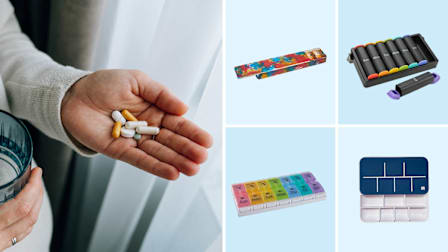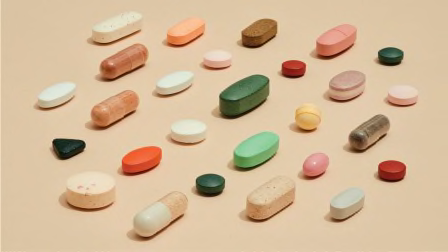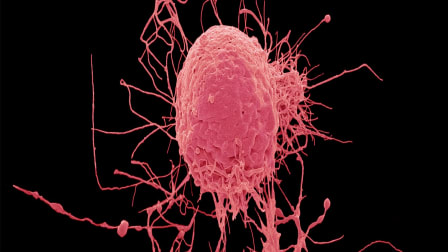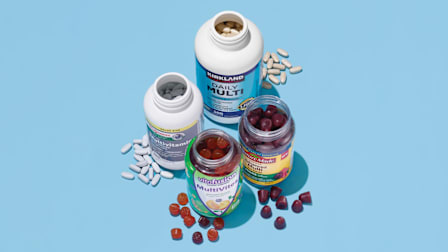Here's How to Get the PrEP Drugs Descovy and Truvada to Prevent HIV for Free
Historically, medications to prevent HIV have been very effective but extremely expensive. New rules mandate that most insurers must now cover the cost.
About 36,000 Americans develop HIV each year, according to the Centers for Disease Control and Prevention. And while there is a new FDA-approved medication (Apretude, approved in 2021) to treat those living with HIV/AIDS, two older prescription meds—Descovy and Truvada—could sharply reduce that number by preventing the infection in people who take them daily.
Often referred to as PrEP, or “pre-exposure prophylaxis,” these drugs are approved for men at high risk of acquiring HIV through unprotected sex or injection drug use. Truvada is also approved for women. But fewer than 1 in 4 of the estimated 1.2 million people in the U.S. who could benefit from the drugs gets a prescription, in part because of the historically high cost, up to $1,800 a month. That means hundreds of thousands of people who could benefit from the medication go without. That’s especially true for African Americans and other people of color.
Most insurers must cover the cost of the drugs for free and cover the cost of the services associated with them, including regular HIV tests and doctor’s office fees, according to recent rules from the Centers for Medicare and Medicaid Services.
There’s also good news for people who don’t have insurance or whose insurance still won’t cover the drugs: A generic form of Truvada, which is just as effective and safe as the brand-name version, can be found for about $30 a month.
A Deep Distrust of the Medical System
One reason for the low number of Black people taking Truvada or Descovy for PrEP is that many of them live in states, mainly in the South, that haven’t expanded their Medicaid programs, Barrington-Ward says.
"There are 1.6 million Georgians, for example, who don’t have health insurance, many of whom are Black men or people of color, who are not getting access to regular checkups and preventative treatment, much less having conversations about their sexual practices," he says.
Another reason is a deep distrust of the medical system among some African Americans, especially in the South and especially related to sexual health, Barrington-Ward says. Some of that distrust traces back almost 90 years to an infamous government-funded study in which Black men with syphilis were told that they were being treated for "bad blood" but didn’t receive care for about 40 years.
"You can’t talk about HIV and other sexual health disparities and not have conversations about that experiment" [the Tuskegee Study of Untreated Syphilis in the Negro Male], Barrington-Ward says. "There are communities in and around metro Atlanta where people have family members or friends who were impacted by the Tuskegee experiments."
That experience still makes many Black men in the U.S. distrustful of government-funded research related to HIV prevention and treatment, he says, and even of programs designed to make the drugs more affordable.
New Federal Requirements
In 2019 the U.S. Preventive Services Task Force—an independent group that helps the government review medical research on drugs and other treatments—concluded that the benefits of Truvada vastly outweigh its risks, giving the drug an A rating. (Descovy wasn’t available in time for that analysis, but an update is currently in the works that will include it.)
The CMS mandate applies to Affordable Care Act plans that individuals purchase on their own through state or federal marketplaces, as well as most Medicaid plans. In the 41 states (and Washington, D.C.) that expanded Medicaid in recent years to allow people with higher incomes to enroll, Medicaid covers the full cost of Truvada for PrEP, with no copays or coinsurance. (See whether your state expanded Medicaid.)
Most insurance offered through employers also must cover Truvada for PrEP, with one exception, according to CMS: if your employer is "self-insured," meaning it pays all its own medical bills, and was "grandfathered," meaning that it got an exception in 2009 when the ACA was passed. Some of those insurers may cover the drug anyway. Contact your human resources department to find out. If your employer doesn’t, ask whether it would consider it.
Nearly all Medicare Part D plans currently cover Descovy, while only some cover either the generic or brand-name versions of Truvada, according to research from GoodRx, which tracks Medicare prescription drug coverage. You’ll need to check before you enroll in a plan during open enrollment toward the end of the year.
If You Don't Have Insurance
Your first step: Check whether you qualify for your state’s Medicaid program. To apply, go to HealthCare.gov and fill out the screener questions about your monthly income and where you live. Depending on your answers, the site may forward you to your state’s Medicaid program.
In states that expanded Medicaid, the monthly income cutoff for 2023 is $1,676 for an individual and $3,450 for a family of four, according to the Kaiser Family Foundation. In other states, the annual median income limit for Medicaid is about $9,447 for a family of three.
If you don’t qualify for Medicaid, your best bet may be to try to buy generic Truvada, which costs just $30 a month by using a coupon found at GoodRx.com. To find the exact price in your location, type in your ZIP code or city to see a list of prices from pharmacies in your area or via mail order.
You can also look into one of these programs:
Ready, Set, PrEP
This federal program offers Descovy and Truvada free to anyone without insurance, regardless of their income level, as long as they have a Social Security number and a prescription. You can apply here or call 855-447-8410.
Once approved, you can fill the prescription at any of the participating pharmacies, which include Albertsons, CVS, Rite Aid, Vons, Walgreens, and Walmart.
Drug manufacturer patient assistance programs
Gilead Sciences makes both drugs available to people whose household incomes are less than 500 percent of the federal poverty level—about $63,800 for an individual and $131,000 for a family of four, according to the Centers for Disease Control and Prevention. You’ll need to be a U.S. citizen, according to a Gilead spokesperson. Go to the Gilead website or call 800-226-2056, 24 hours a day, 7 days a week.
Patient groups
Several national patient groups—organized groups that represent patients with a specific disease or condition—offer medical services as well as free or reduced-cost PrEP. They all have different requirements; check to see whether you qualify. The Department of Health and Human Services maintains a list of state-specific HIV support groups. Here are some national and regional ones:
- Good Days: To apply, you’ll need to have a Social Security number and valid Medicare or military insurance that covers at least half of your medical costs, and your income can’t exceed 500 percent of the federal poverty limit. If you meet those requirements, you can get help with out-of-pocket costs for HIV drugs up to $7,500 per year, says Clorinda Walley, president of Good Days. To apply, go to the Good Days website or call 877-968-7233. A healthcare provider, including your pharmacist, can also apply on your behalf.
- Patient Advocate Foundation: This nonprofit operates the Co-Pay Relief program, which covers copay costs up to $7,500 for HIV/AIDs treatments per year, regardless of your insurance, as long as your earnings don’t exceed 400 percent of the federal poverty level (about $58,000 for an individual). Apply at copays.org or call 866-512-3861.
- AIDS Healthcare Foundation: This group can fill HIV prescriptions free and provide other HIV-related services to people living in California, Florida, Nevada, Ohio, Texas, Washington, D.C., and several other states. You don’t need to be a U.S. citizen to get help, says Adam Sukhija-Cohen, PhD, director of advocacy and policy research at the foundation. Patients simply need a photo ID. Make an appointment for HIV care at hivcare.org, or walk in for free testing for HIV and sexually transmitted diseases—as well as PrEP and post-HIV exposure, or "PEP" services—at AHF’s Wellness Centers. Find one at freestdcheck.org.
If Your Insurance Doesn't Cover PrEP
For people whose plans don’t cover PrEP, Gilead also offers a copay assistance program that covers up to $7,200 in copays per year.
Tim Wagner, 54, of Seattle says that when he used the program to cover his $125 annual drug deductible and the $50 monthly copay, doing so saved him hundreds of dollars. He takes several prescription medications and says he’s always looking to cut his costs when possible.
If you have insurance through your employer but were denied coverage, it’s worth asking for an exception. Gilead says it can help in that process: Call 800-226-2056. If needed, ask your doctor to help you file an appeal.
Other assistance can be found via your state. California, Colorado, Florida, Illinois, and Massachusetts, for example, offer discount or free assistance programs.
Editor’s Note: This article was updated to include information about the period injectable, Apretude, approved for use to prevent HIV in 2021. It also now includes updated figures around the annual number of people diagnosed with HIV, as well as the percentage of those who have a prescription for PrEP—and who qualifies for their state’s Medicaid program. It was originally published on June 30, 2020, and previously updated on July 27, 2021.

